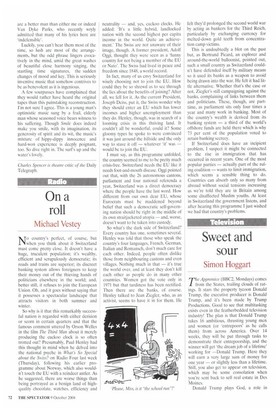On a roll
Michael Vestey
No country's perfect, of course, but when you think about it Switzerland must come pretty close. It doesn't have a huge, truculent population; it's wealthy, efficient and scrupulously democratic; its roads and trains are superior; its discreet banking system allows foreigners to keep their money out of the thieving hands of politicians elsewhere in the world; and, better still, it refuses to join the European Union. Oh, and it goes without saying that it possesses a spectacular landscape that attracts visitors in both summer and winter.
So why is it that this remarkably successful nation is regarded with either derision or scorn in certain quarters and that the famous comment uttered by Orson Welles in the film The Third Man about it merely producing the cuckoo clock is so often trotted out? Presumably, Paul Henley had this thought in mind when he delved into the national psyche in What's So Special about the Swiss? on Radio Four last week (Thursday), following his earlier programme about Norway, which also wouldn't touch the EU with a reindeer antler. As he suggested, there are worse things than being portrayed as a benign land of highquality chocolate, watches, efficiency and
neutrality — and, yes, cuckoo clocks. He added: 'It's a little hybrid, landlocked nation with the second highest per capita income in the world. Quite an achievement.' The Swiss are not unaware of their image, though. A former president, Adolf Oggi, thought they were seen as a 'funny country for not being a member of the EU or Nato'. The Swiss had lived in peace and freedom since 1848, a world record.
In fact, many of us envy Switzerland for wisely choosing not to join the EU. How could they be so shrewd as to see through the lies about the benefits of joining? After all, we fell for it. As the current President, Joseph Deiss, put it, the Swiss wonder why they should enter an EU which has lower incomes and higher unemployment than they do. Henley, though, was in search of a looming crisis in this thriving land. It couldn't all be wonderful, could it? Some gloomy types he spoke to were convinced it was just around the hillside and the only way to stave it off — whatever 'it' was — would be to join the EU.
I must say, as this programme unfolded, the country seemed to me to be pretty much crisis-free. Switzerland needs the EU like it needs foot-and-mouth disease. Oggi pointed out that, with the 26 autonomous cantons, parliament and four national referenda a year, Switzerland was a direct democracy where the people have the last word. How different from our own dear EU, whose Eurocrats must be maddened beyond belief that such a democratic self-governing nation should be right in the middle of its own straitjacketed utopia — and, worse, doesn't want to be taken into custody.
So what's the dark side of Switzerland? Every country has one, sometimes several. Henley was told that those who speak the country's four languages, French, German, Italian and Romansch, don't much care for each other. Indeed, people often dislike those from neighbouring cantons and even villages. Nothing much in that — it's true the world over, and at least they don't kill each other as people do in many other countries. Women got the vote only in 1971 but that tardiness has been rectified. Then there are the banks, of course. Henley talked to Jean Ziegler, who, as an activist, seems to have it in for them. Fle felt they'd prolonged the second world war by acting as bankers for the Third Reich, particularly by exchanging currency for melted-down gold teeth from concentration camp victims.
This is undoubtedly a blot on the past but, as Bertrand Picard, an explorer and around-the-world balloonist, pointed out, such a small country as Switzerland couldn't have defended itself by military means so it used its banks as a weapon to avoid being drawn into the war. He felt it had little alternative. Whether that's the case or not, Ziegler's still campaigning against the banks, complaining of links between them and politicians. These, though, are parttime, as parliament sits only four times a year and many work in banking. Most of the country's wealth is derived from its banking system — a third of the world's offshore funds are held there which is why 73 per cent of the population voted to retain banking secrecy.
If Switzerland does have an incipient problem, I suspect it might be connected to the rise in immigration that has occurred in recent years. One of the most popular parties — actually part of the ruling coalition — wants to limit immigration, which seems a sensible thing to do. Countries can absorb only so many from abroad without social tensions increasing as we're told they are in Britain among some disaffected Muslim youths. At least in Switzerland the government listens, and after hearing this programme I just wished we had that country's problems.


















































































































 Previous page
Previous page